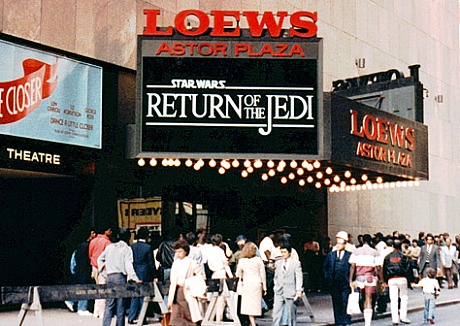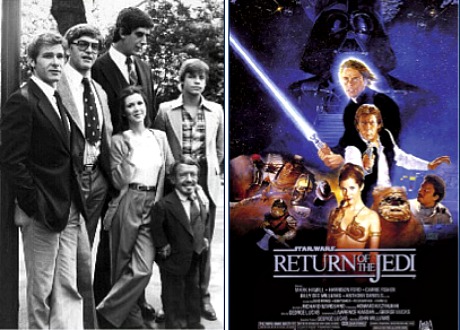I missed last Saturday’s 30th anniversary celebration of the commercial debut of Return of the Jedi, which happened on 5.25.83. As all true Star Wars fans know, Jedi was a kind of tragedy as it strongly indicated to anyone who was halfway hip that Star Wars creator and Jedi producer George Lucas had sadly evolved into a shameless hack and that the Star Wars series was effectively over and would never again deliver the power, gravitas and coolness of The Empire Strikes Back.

I knew this instantly after seeing Jedi with some friends at the all-media screening at Leows Astor Plaza, which happened maybe 8 or 9 days before the 5.25.83 debut. What a curious bummer that night was. There was this awful queer feeling in the room as the closing credits played and people kind of half-looked at each other and muttered “what’s up with those little fuzzy-wuzzies? What are they called…Ewoks? And that forced happy ending with everyone laughing and hugging around the campfire?”
I wrote my review for The Film Journal a day or two later, and I began my summary by saying that “the great finale falls short.” What I meant was that the great finale more or less blew chunks. It still does today. I know that I’ll never watch it again.
Last weekend The Digital Bits ran a clueless little suck-up piece by newly hired columnist Michael Coates titled “Where Were You on Opening Day?”
“If you are a Star Wars fan of a certain age, chances are you remember where you were [on Jedi‘s opening day],” Coates began. “Like countless others who ditched school or called in sick to work, you were probably standing in a very long line awaiting your opportunity to see the concluding chapter of George Lucas’s original Star Wars trilogy. Yes, believe it or not, Return of the Jedi has turned thirty years old.” And is something to celebrate…right, Michael?
I say “no” to that. Let’s instead look back instead to an 8.12.10 piece by L.A. Times/Hero Complex columnist Geoff Boucher, which I repeated portions of in an 8.14.10 HE article called “Toy Story.” [Apologies for not including embed codes, but for whatever bizarre reason the WordPress embed code function isn’t working for me in France.]
In this nearly three-year-old article Boucher interviewed former Star Wars producer and Lucas partner Gary Kurtz, who claimed that Lucas rewrote Return Of The Jedi to ensure merchandise sales were not hurt.
“Instead of bittersweet and poignant [Lucas] wanted a euphoric ending with everybody happy,” Kurtz recalled. “The original idea was that they would recover [the kidnapped] Han Solo in the early part of the story and that he would then die in the middle part of the film in a raid on an Imperial base. George then decided he didn’t want any of the principals killed. By that time there were really big toy sales and that was a reason.”

“I could see where things were headed,” Kurtz continues. “The toy business began to drive the [Lucasfilm] empire. It’s a shame. They make three times as much on toys as they do on films. It’s natural to make decisions that protect the toy business, but that’s not the best thing for making quality films.”
“The ending of Jedi that Kurtz preferred ‘would have shown the rebel forces in tatters, Leia grappling with her new duties as queen and Luke walking off alone like Clint Eastwood in the spaghetti westerns.’
“But after helping to create the first two Star Wars films, Kurtz ‘became disillusioned with Lucas just before Return Of The Jedi, when he noticed that Lucas’ priorities had shifted away from story and character toward selling toys.
“Eventually the two decided they couldn’t work with each other anymore, especially after finding themselves unable to come to an agreement over what form Jedi should take — particularly given Lucas’ idea of framing it around a second Death Star, which Kurtz felt was ‘too derivative.’
“Things apparently came to a head over the ending, which Lucas completely rewrote because, as Kurtz avers, it might have affected the merchandising.
“’The emphasis on the toys, it’s like the cart driving the horse,’ Kurtz says. ‘If it wasn’t for that the films would be done for their own merits. The creative team wouldn’t be looking over their shoulder all the time.’
I concluded my piece with the following: “This dovetails into my oft-repeated feelings about Lucas, which are basically that he’s the devil, which is to say a very real metaphor for total corruption of the spirit.
“He began as Luke Skywalker, having been described by biographer Dale Pollock as a kind of a brave and beautiful warrior when he was under the gun and struggling to make it in the ’60s and into the early ’70s. But once he got fat and successful he slowly began to morph into an amiable, goiter-necked, corporate-minded Darth Vader figure. I’ve been saying this since the late ’90s.”










